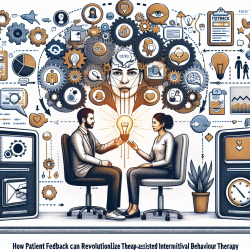In the ever-evolving field of speech-language pathology, making data-driven decisions is crucial for optimizing therapeutic outcomes. A recent study titled Patient Perspectives on Strengths and Challenges of Therapist-Assisted Internet-Delivered Cognitive Behaviour Therapy: Using the Patient Voice to Improve Care provides valuable insights that can help practitioners refine their approaches to Therapist-Assisted Internet-Delivered Cognitive Behaviour Therapy (T-ICBT). The study surveyed 225 patients to understand their experiences and recommendations, shedding light on how T-ICBT can be more patient-centered and effective.
Key Findings from the Study
The study's findings can be summarized into three main areas: content, process, and therapist contact. Here’s a closer look at each:
- Content: The majority of patients appreciated the cognitive and behavioral skills taught in the course. They particularly valued the inclusion of narratives and downloadable DIY guides. However, some patients found the stories unrelatable and suggested the need for more varied and engaging content.
- Process: Patients valued the ability to download and retain materials for future use. There were suggestions for more flexible timelines to accommodate individual learning paces. The online format was generally well-received, though it required a high level of self-motivation.
- Therapist Contact: Mixed feedback was received regarding therapist contact. While some patients appreciated the weekly email interactions, others desired more personalized and frequent communication, including phone calls.
Implementing Patient Feedback for Improved Outcomes
Practitioners can enhance their T-ICBT programs by incorporating the following recommendations derived from patient feedback:
- Enhance Content: Include a wider range of stories to make the content more relatable. Consider integrating multimedia elements like audio and video to enrich the learning experience.
- Flexible Timelines: Allow patients to adjust their course timelines based on their individual needs. This flexibility can help them better absorb and apply the therapeutic techniques.
- Personalized Therapist Contact: Offer more personalized and frequent interactions, possibly through phone calls or video chats, to build a stronger therapeutic relationship.
Encouraging Further Research
While this study provides valuable insights, further research is essential to continually refine T-ICBT. Future studies could explore the impact of different types of narratives on patient outcomes or the effectiveness of various communication methods between therapists and patients. By continuously integrating patient feedback, we can ensure that T-ICBT remains a robust and patient-centered therapeutic option.
To read the original research paper, please follow this link: Patient Perspectives on Strengths and Challenges of Therapist-Assisted Internet-Delivered Cognitive Behaviour Therapy: Using the Patient Voice to Improve Care.










